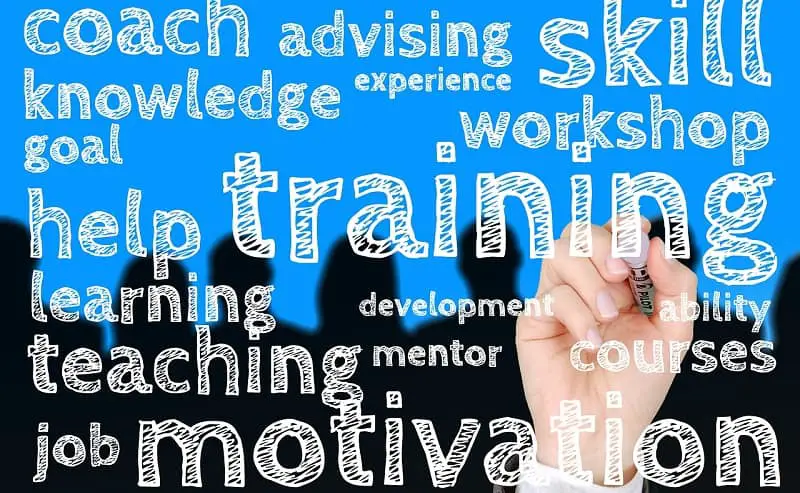A training specialist identifies the training needs of individuals by assessing their strengths and weaknesses. The following 20 questions should help you prepare for a job interview.
1. Why Are You Interested In This Role?
This is usually the first question in many instances. It is as simple as it sounds. The interviewer wants to know what irked your interest.
Tip #1: Your reasons should not be self-centred
Tip#2: Ensure that you relate your reasons to the job
Sample Answer
I am passionate about human interaction. I love to help people achieve their potential. This job allows me to further my skills and achieve my goals. Also, given that your firm is huge, I will be interacting with more people.
2. What Are The Roles Of A Training Specialist?
This is self-explanatory. The interviewer is trying to find out whether you know what is expected of you. You do not have to think hard.
Tip #1: Mention the roles of a training specialist
Tip #2: Ensure that the roles you are mentioning fit the job description
Sample Answer
A training specialist is charged with identifying the training needs of individuals by evaluating their strengths and weaknesses. He/ she also comes up with annual training programs and prepares teaching plans.
3. What Are The Qualities Of A Training Specialist?
What does it take to be a training specialist? That is all the interviewer wants to know.
Tip #1: You should mention the qualities that make one a good training specialist.
Tip #2: Talk about the qualities that have made you flourish
Sample Answer
A good training specialist should have strong industry and content knowledge. He/ she should also be a good communicator owing to the nature of the job at hand. Flexibility and creativity are also added qualities that can help a training specialist thrive.
4. What Major Challenges Did You Face During Your Last Role? What Did You Learn From It?
Here, the interviewer wants to know some of the lessons you have learned so far in the course of your operations.
Tip #1: Try as much as possible to talk about a personal experience
Tip #2: Make sure that you clearly illustrate the lesson learned
Sample answer
One of the biggest challenges during my last role was coordinating with my supervisor. She was unavailable most of the time, which proved to be a huge setback. I had a sit down with her and explained why her presence was necessary, which she understood.
5. Describe Your Daily Routine As A Training Specialist
How does your day look like? What do you do on a normal basis?
Tip #1: Mention what you do daily.
Tip #2: Restrict yourself to the job
Sample Answer
My day is all about designing, planning, organizing, and directing training programs for employees and customers. I also evaluate modes of training delivery to settle on one that is effective. I also keep up with my training specialty by reading books and researching ways to get better each day. Lastly, I monitor, evaluate, and record training activities and programs.
6. Briefly Describe Your Experience.
This is simple. Tell the interviewer some of the places you have worked in and the experiences you have obtained over time.
Tip #1: Talk in the present.
Tip #2: Talk about any relevant experience that you can think of.
Sample Answer
This is my fifth year with Latiff Groups of Companies as a lead training specialist. My first workplace after college was Dough Penitentiary, where I was charged with training the prison staff. I later left for Simpson General autos to be the chief training specialist before joining my current company.
7. What Kind Of Strategies And Mindset Is Required For This Role?
Though it may not seem obvious, the employer wants to know whether you have the right push for the job.
Tip #1: Mention a strategy that you have always found to be successful.
Tip #2: mention the right mindset
Sample Answer
I believe that this job requires somebody motivated and patient enough. One has to understand that he/ she is dealing with different people who have different learning abilities. When it comes to strategy, group working really helps when training, especially if one deals with a huge number of employees.
8. What Is The Biggest Challenge That You Foresee In This Job?
The interviewer wants to know whether you had done prior homework about the job.
Tip #1: Be honest. The employer is not trying to implicate you.
Tip #2: Ensure that you suggest a solution to the challenge at hand.
Sample Answer
I have done my research beforehand and identified that you have foreign nationals, and some are not as fluent in English. Given that I mostly speak in English, I believe that getting across to them might be challenging. However, I am sure that we can come up with measures of dealing with this.
9. How Do You Stay Motivated At Work?
The interviewer wants to know what keeps you interested in your work.
Tip #1: Make it personal
Tip#2: Whatever reason you give, ensure that it is work-related
Sample Answer
I love interacting with people owing to my vast interpersonal and communication skills. Therefore, I always enjoy my specialty. I am also passionate about results. I love to see those that I have trained flourish in their respective fields, which pushes me to keep on doing what I am good at.
[VIDEO] Top 20 Training Specialist Interview Questions with Sample Answers: ► Subscribe for more useful videos
10. Describe A Time When You Failed In This Role And The Lesson You Learned.
This is not an incriminating question. The interviewer wants to know whether you have learned something from the failures you have encountered in your job.
Tip #1: make sure that the example you give was unintentional
Tip #2: Ensure that there is a well laid-out lesson.
Sample Answer
During my first years as a training specialist, I suggested to my agency that we should have an optional training course on safety. The company approved, but later the employees had a hard time accepting to be part of it. Those who agreed left midway citing difficulties and clashing timelines. I learned that even though a course may be helpful, I should always conduct proper research before proposing its introduction.
11. How Would You Treat A Candidate Who Does Not See Any Sense In Your Training Session?
The interviewer is testing your interpersonal skills. Therefore, you should approach this question with tact. The wrong answer can make you lose a chance.
Tip #1: Do not talk about force or threats
Tip #2: make sure that you touch on persuasion
Sample Answer
I have worked with such employees before, and I understand that it is normal. In such situations, force or reporting to the authority is not a good solution. I will organize a sit-down with the employee and explain to him/ her the importance of the training sessions and work together to find a routine that works for him/ her.
12. How Would You Identify Training Needs?
This is a common interview question used by employers to gauge whether you have what it takes to deliver. Your knowledge of training is being tested.
Tip #1: Touch on basic skills.
Tip#2: Show that you properly understand the desired skills for every position
Sample Answer
I will work with the ideal candidate/ employee profile to assess the desired skills for each position. Remember that we cannot do a good job without a proper skill gap analysis. I will assess the employees, interview them, and conduct performance reviews.
13. Have You Ever Had Difficulty With A Supervisor?
The interviewer is not trying to implicate you. Therefore, you do not have to lie about your stalemate with a supervisor.
Tip #1: Be honest
Tip #2: Do not throw yourself under the bus
Sample Answer
I once had a supervisor who didn’t communicate clearly. He was not also present most of the time, which I found to be inconveniencing. I had a sit-down with him one day and explained what I felt, and we came up with solutions that saw us going.
14. Why Do You Think Career Training Is Important For An Organization?
You are being asked why you think your job will be a great input for the firm. Luckily, there are so many answers that you can offer.
Tip #1: show the interviewer that you know your role
Tip #2: Tell him/ her why you feel your role will fit in the organization
Sample Answer
Career training improves productivity and performance. Training helps employees improve their skills, which sees them expanding their knowledge of the job. Therefore, I believe that I will be a perfect addition to your time and help your firm and employees more productive.
15. Describe Your Training Style
Here, you need to talk about a style that you find more successful and one that helps you get to the employees.
Tip #1: Talk about something you love doing
Tip #2: You do not have to restrict yourself to only one approach
Sample Answer
I love interactive sessions. Therefore, when training, I usually employ group interactions. I also prefer group activities because I believe that employees learn better through interaction. I also use charts and symbols to enhance memory.
16. Can You Create Training Materials From Scratch?
Here, the interviewer is assessing your creativity. Therefore, ensure that you answer this tactfully.
Tip #1: You can talk about a relatable experience
Tip #2: If you have no such experience, convince the interviewer that you are confident in your abilities.
Sample Answer
I consider myself a very creative person, owing to the nature of projects that I have handled effortlessly. Once I learn and understand the training needs of the employees and the goals that I would like to achieve, piecing together training materials should not be hard.
17. Why Do You Think You Are The Perfect Fit For This Job?
This is a chance to sell yourself. Convince the interviewer that you can help him/her and the company achieves their goals. You do not have to restrict yourself.
Tip #1: You can briefly talk about how your experience shapes you for the job
Tip #2: You can talk about some of your skills.
Sample Answer
I have good communication skills; thanks to the years I have spent in this field. I can also easily recognize the team’s weaknesses and strengths and help them improve in such areas. I also love the nature of this job and have the relevant experience.
18. How Would You Train A New Salesperson?
The interviewer is trying to ascertain how good you are at your job. Keep in mind that training a salesperson is not an easy task, and therefore, you must be careful with this question.
Sample #1: Convince the employer that you can do whatever is expected from you.
Sample #2: Be confident in your training skills
Sample Answer
To effectively train a salesperson, I will ensure that successful salespeople lead the class. I will then take him/ her over what is expected and some of the skills required in this field. (You can then mention your training techniques, step to step)
19. How Would You Motivate Employees To Take An Optional Course?
The interviewer is testing your convincing or persuasion skills.
Tip #1: Make sure that you convince the interviewer that you can persuade.
Tip #2: Your answer should be clear.
Sample Answer
Convincing an employee to take an extra course requires persuasion. I will first start by explaining to him/ her the importance of the course in question and how it will help in his/her job nature. I will then give the employee some time and work on a training plan that will be conducive.
20. Do You Have Any Questions For Us?
This question usually comes at the end of the interview. There are several reasons why an interviewer can ask you this. Therefore, think first before answering.
Tip #1: Do not touch on issues dealing with pay
Tip#2: You can ask about issues related to the job at hand.
Sample Answer
With your kind permission, sir, I would like to know about the feedback to know how well to plan myself. I’d also love to know if you expect some added roles from a training specialist, owing to your firm’s nature.
Conclusion
Every serious organization needs the input of a training and specialist coordinator. In case you have a scheduled interview, these top 20 training specialist interview questions will help you with preparations.




